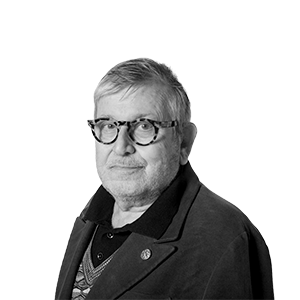

Fifty years ago, half a century!, Pier Paolo Pasolini was murdered. It was All Saints' Day, like today, of course, and after having dinner with his beloved Ninetto Davoli and his wife in a trattoria PPP left Rome. Davoli's wife said to him, "Why don't you go with him?" But Davoli knew he couldn't. PPP went to Termini Station. There, a young man named Pelosi got into PPP's Giulietta. He invited the boy to dinner at a trattoria near the Tiber. He didn't eat anything; he had already had dinner. Then they went toward Ostia. The next morning, the poet's body was found in an open field. Everything that happened exactly is unknown to us. Pelosi was accused of murder, and he confessed. But not everyone believed him. It's a crime that has never been solved.
Pasolini had many enemies because he was relentless in his poetry, his films, his plays, and his articles. He never stopped denouncing what, in his eyes, was a chilling crime: the corruption, by capital, political parties, and the Catholic Church, of everything authentic in human life. That's what his poetry, his plays, and his essays are about. In the May '68 revolts, PPP sided not with the students, but with the police who were beating them. The argument was that the students were privileged, bourgeois children, while the police officers were working-class children who became police officers because they hadn't had any other opportunity. Pasolini was a thorn in people's side. He denounced the traces of fascism he saw in the society of his time. He made many enemies. When he was killed, he was working on a novel. PetroleumMagmatic, unfinished, where he reviewed the evolution of his society toward evil and denounced those responsible.
Who killed Pasolini? The case was quickly resolved: a boy pleads guilty and that's it. How easy it was for the judges, who had spent their lives judging the victim. Pasolini went from trial to trial. One film was denounced for obscenity; another, for being scandalous; another, for being blasphemous. Pasolini was an obstacle; everyone with a certain amount of power wanted to get rid of him. Who orchestrated his murder? Was it just Pelosi's personal revenge? I've never believed that.
Pasolini was, fundamentally, a poet. His cinema, which made him famous, sprang from his personal conception of poetry. As did his theater. This—he said—was theater WordHis films were like that. ImageA former disciple and friend of Roberto Longhi, the great art historian, Pasolini, himself a painter in his spare time, was a great art enthusiast, and his films often drew upon it. Close-ups, unfamiliar faces, wove a poetics of surprising reality. The stillness of the primitives permeates his vision. He, too, when he directed his play OrgyHe opted for that static quality he derived from the art of primitives. According to Luca Ronconi, Pasolini's direction was a failure because the words—the Word—didn't reach the audience due to the actors' static nature, and if they did, they returned to the stage like a boomerang.
A poem, Verses from the testamentwhich I translated at the request of Xavier Albertí for his unforgettable show PPP, It begins: "You have to be very strong to love solitude..." Pasolini was a solitary man who loved his solitude. A profound solitude, of the soul, from which his poetry was born, whether in verse, theater, or film. This solitude of the soul did not prevent him from having friends. Above all, he was a friend of Alberto Moravia and Dacia Maraini, with whom he built a double house in the dunes of Sabaudia. And of Elsa Morante. The list of his friends is enormous. Bertolucci, who served as his assistant director onAccattone, Fellini, Bolognini, Maselli—all the directors who had something to say in their time. And the actors: Maria Callas, with whom he had a loving friendship, so to speak; Silvana Mangano, the mother of Theorem; Anna Magnani, the protagonist of Mamma Roma…And the boys: Franco Citti and especially Ninetto Davoli, who was much more than a friend. They were together for nine years, and when Davoli told him he was getting married, Pasolini fell into a deep depression.
Faced with the changes in society, corrupted by consumerism, he said it wasn't a generational change, but an anthropological one… Now we've arrived. He was a prophet.
